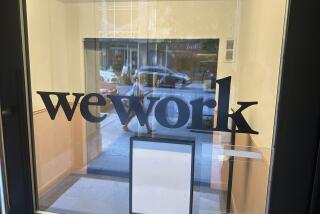Apparel Firm Seeks to Go Public to Cut Debt : Shares: Cherokee Inc. of Sunland is counting on the proceeds of a stock offering to make inroads on its borrowings.
- Share via
As a maker of moderate-priced clothing, Cherokee Inc. is no slave to fashion. But the company’s finances have not been free from faddishness.
In May, 1989, with help from former junk-bond powerhouse Drexel Burnham Lambert, a group led by investors Jeffrey S. Deutschman, Everett M. Clayton III and some Cherokee managers took the Sunland apparel company private, loading it with $164 million in debt.
Today Drexel is in bankruptcy proceedings and that much debt is frowned on. Moreover, Cherokee is faced with having to pay back a big chunk of that debt--its bank borrowings, which now total about $41 million--in about a year.
Although Cherokee’s sales have continued to swell lately, a sum like that isn’t coming from the company’s cash flow, said Andrea Uttaro, who follows Cherokee for the bond-research firm Standard & Poor’s. On top of that, the interest rate on Cherokee’s junk bonds--under a formula devised when the bonds were issued--could jump two percentage points to 17.5% at about the same time that the bank borrowings mature.
“It is quite obvious that something will have to occur between now and then,” Uttaro said.
That something, Cherokee hopes, will be a public offering of stock. The company has announced plans to raise about $20 million by selling 2.5 million common shares to the public at an estimated price of $8 each, according to its filing with the Securities and Exchange Commission. The company would use the approximately $18 million in net proceeds it would receive after underwriting costs to pay off some of its bank financing.
This isn’t the first time Cherokee has looked to a stock offering to help it out of its debt problems. A year ago, the company announced a plan to sell as much as $48 million worth of stock. But those shares had minimal voting power, were to be sold for up to $12 each, and as the offering was prepared for sale, the market for initial public offerings soured; Cherokee dropped the plan last fall. The unsuccessful offering nonetheless cost Cherokee $1.1 million in paperwork and fees.
While all its debt may make Cherokee’s balance sheet look weak, the debt could turn out to be a bonanza for the company’s current shareholders--a group that includes Deutschman and Clayton, as well as Robert Margolis, chief executive of the company, Jay L. Kester, president of its apparel division, and Cary D. Cooper, its chief financial officer.
It’s the heavy borrowing that allowed those current owners to buy the shares they now own for about $1.06 each. (Some shareholders also put additional money into Cherokee, getting some preferred stock in return.) If the new public shares sell, as planned, for about $8 each, the current owners will record a paper profit on their shares of $6.94 each--or about $42.5 million total. But only the company is selling shares in the current offering, so the current stockholders won’t realize any gain yet.
Cherokee makes mostly women’s clothes and sells them through about 12,000 retail stores in the United States, most notably the Mervyn’s department store chain which accounts for more than a fifth of its sales. Cherokee calls its clothing styles “basic, recurring” and “less susceptible to ‘fashion obsolescence.’ ”
Alan Millstein, publisher of the Fashion Network Report in New York, said Cherokee clothes are for “people who are counting their pennies” and who “aren’t waiting for the new issue of Vogue or W to tell them what to buy.”
Cherokee reported a profit of $651,000 in the nine months ended March 2, compared to a loss of $398,000 during the same period a year earlier. But without a one-time gain of $1.61 million--which came because Cherokee bought back some of its own bonds on the open market, using bank borrowings--Cherokee would have lost $954,000 in the recent nine months.
Aside from the heavy debts, Cherokee’s business is doing well. The company’s sales grew 16% to $177 million in the recent nine months from $152 million a year earlier. And Cherokee’s operating profit--before debt interest costs and taxes are subtracted--for the period grew 5% to $22.4 million from $21.3 million.
A particular standout in Cherokee’s performance was its licensing division, which arranges for other manufacturers to use the Cherokee name in exchange for fees. Licensing revenues grew 75% to $2.67 million in the nine months ended March 2 from $1.53 million a year before. Because there are no manufacturing costs in the licensing, all that revenue contributes to Cherokee’s gross profit.
But there’s no overlooking Cherokee’s large debts. The company had $162 million in long-term debt as of March 2. Of that, $41.1 million was in bank borrowings, $98 million was in junk bonds and $19 million was in other subordinated debt. Thanks to all that debt, Cherokee had a whopping $21.3 million in interest expenses deducted from revenue in the nine months ended March 2.
The offering could help. If Cherokee had completed the current offering a year ago, those interest expenses would have been $19.4 million, according to its SEC filing.
Nevertheless, Cherokee maintains in the SEC filing that even if it is unable to complete the current offering--in fact, even if the interest rate on its junk bonds jumps to 17.5%--it will be able to make its cash interest payments.
Cherokee’s filing also includes other warnings.
For one thing, Cherokee points out that the apparel business suffers “substantial cyclical variation.” And Cherokee reveals that Mervyn’s stores accounted for 22% of its sales in the latest nine months, up from 20% of its sales in the twelve months ended June 2, 1990. Such reliance on a single customer is generally a troublesome sign. But fortunately for Cherokee, Mervyn’s is a subsidiary of Dayton Hudson Corp., one of the nation’s healthiest retailers.
The offering will also leave Deutschman and Clayton with 66% of the voting control of Cherokee, even though the public will have contributed 75% of the money paid for shares of Cherokee stock.
Finally, Cherokee warns that its performance is dependent on some of its top executives, including Margolis and Kester. But Cherokee should have a good chance of retaining those top managers. Margolis was paid $400,000 in salary and a $1.2-million bonus in fiscal 1990, while Kester received $300,000 in salary and an $800,000 bonus. And under a management agreement, Cherokee pays corporations owned by Deutschman and Clayton a $500,000 annual fee, plus a bonus worth up to $250,000.
More to Read
Inside the business of entertainment
The Wide Shot brings you news, analysis and insights on everything from streaming wars to production — and what it all means for the future.
You may occasionally receive promotional content from the Los Angeles Times.










